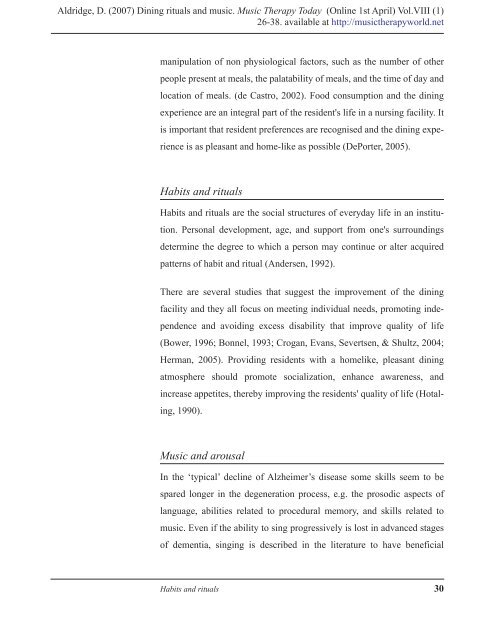Music Therapy Today - World Federation of Music Therapy
Music Therapy Today - World Federation of Music Therapy
Music Therapy Today - World Federation of Music Therapy
Create successful ePaper yourself
Turn your PDF publications into a flip-book with our unique Google optimized e-Paper software.
Aldridge, D. (2007) Dining rituals and music. <strong>Music</strong> <strong>Therapy</strong> <strong>Today</strong> (Online 1st April) Vol.VIII (1)<br />
26-38. available at http://musictherapyworld.net<br />
manipulation <strong>of</strong> non physiological factors, such as the number <strong>of</strong> other<br />
people present at meals, the palatability <strong>of</strong> meals, and the time <strong>of</strong> day and<br />
location <strong>of</strong> meals. (de Castro, 2002). Food consumption and the dining<br />
experience are an integral part <strong>of</strong> the resident's life in a nursing facility. It<br />
is important that resident preferences are recognised and the dining expe-<br />
rience is as pleasant and home-like as possible (DePorter, 2005).<br />
Habits and rituals<br />
Habits and rituals are the social structures <strong>of</strong> everyday life in an institu-<br />
tion. Personal development, age, and support from one's surroundings<br />
determine the degree to which a person may continue or alter acquired<br />
patterns <strong>of</strong> habit and ritual (Andersen, 1992).<br />
There are several studies that suggest the improvement <strong>of</strong> the dining<br />
facility and they all focus on meeting individual needs, promoting inde-<br />
pendence and avoiding excess disability that improve quality <strong>of</strong> life<br />
(Bower, 1996; Bonnel, 1993; Crogan, Evans, Severtsen, & Shultz, 2004;<br />
Herman, 2005). Providing residents with a homelike, pleasant dining<br />
atmosphere should promote socialization, enhance awareness, and<br />
increase appetites, thereby improving the residents' quality <strong>of</strong> life (Hotal-<br />
ing, 1990).<br />
<strong>Music</strong> and arousal<br />
In the ‘typical’ decline <strong>of</strong> Alzheimer’s disease some skills seem to be<br />
spared longer in the degeneration process, e.g. the prosodic aspects <strong>of</strong><br />
language, abilities related to procedural memory, and skills related to<br />
music. Even if the ability to sing progressively is lost in advanced stages<br />
<strong>of</strong> dementia, singing is described in the literature to have beneficial<br />
Habits and rituals 30

















